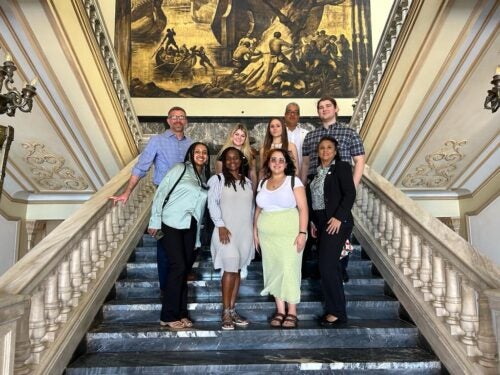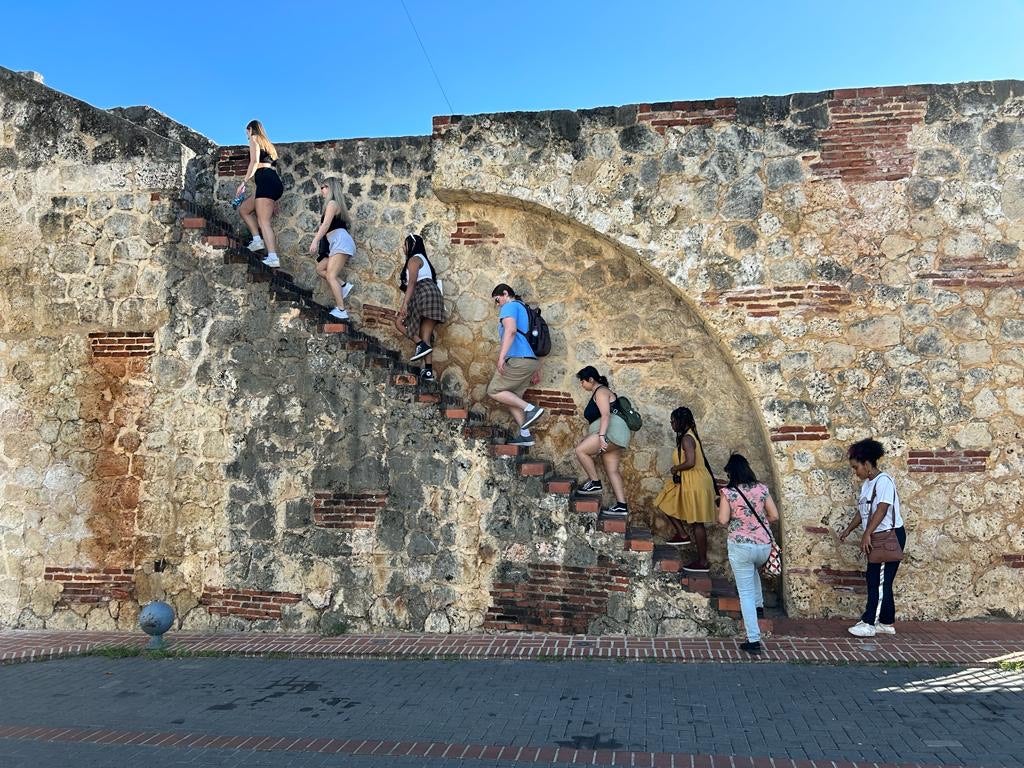While most students were enjoying a January winter break away from the classroom, five URI education students traveled to the Caribbean for a J-term course, EDC 278/478 – A Cross-cultural Understanding of Socio-political Issues, Educational Challenges, and Interventions within the U.S. and the Dominican Republic, to participate in a unique international experience to gain a better understanding of the historical, cultural, political, and economic dynamics that contribute to contemporary societal issues, with an emphasis on educational practices and challenges in the Dominican, through community visits, cultural and historical tours and service-learning experiences.
By the end of the program students were able construct a critical analysis that compared social inequities in the Dominican and U.S.
Tashal Brown, assistant professor of Urban Education and Secondary Social Studies, and Colleen Rossignol, coordinator of Global Education and Partnerships, teamed up with community organizations in the Dominican Republic to develop the course where the students could engage with rural and urban community-based Dominican organizations and youth-led programs to learn about and observe their community challenges and interventions. This initiative was led by Brown and academic advisor George Nippo.
“When creating the J-Term course for the Dominican Republic, my primary objective was to ensure that students would gain a nuanced understanding of the historical, cultural, political, and economic factors influencing current societal issues,” said Brown.
She added that while traditional classroom-based courses are valuable and can be transformative, the study abroad program in the Dominican Republic provided a “distinct and immersive educational and cultural experience” that encouraged active engagement with diverse perspectives and ways of life.
As part of the course, students examined interventions that promoted social change. They embarked on a decolonial tour in Santo Domingo to learn about the island’s history from the enslaved African perspective, toured the Memorial Museum of Dominican Resistance to learn about the dictatorship of Rafael Trujillo, highlighting the 1916–1978 period, which included the Haitian genocide, civilian protests, the U.S. occupation in the Dominican Republic, and the Joaquín Balaguer dictatorship that ended in 1978, and visited a Cacao farm in the mountainous region, San Francisco de Macoris to learn about one of the country’s largest industries and saw how a Cacao seed becomes a candy bar.
The group also visited two communities to hear from leaders who are working on some challenging human rights issues of our time. While in the urban city of Haina, they learned about the negative environmental impacts the plastic industry has on their community and their education program, youth pregnancy prevention and sexual health initiatives, and economic development initiatives. Students participated in a beach clean-up to see first-hand how important environmental education is for health and wellbeing.
The last visit was to Batey Bienvenidos, a stateless Haitian community where residents were stripped of their Dominican citizenship due to recent immigration policies enacted in the last decade, removing their ability to legally work or attend school. The nonprofit organization Fundación el Mercado shared history, challenges and interventions in place to provide basic necessities such as clean water, food and access to elementary school.
Winter J-term is a three-week academic mini-semester at the beginning of January to the start of the spring semester. This course offers future educators a unique opportunity to experience another country and culture that is prevalent in Rhode Island classrooms. This program aims to provide students with experience to better manage a diverse classroom by having these experiences with a demographic and culture representative in Rhode Island classrooms.


